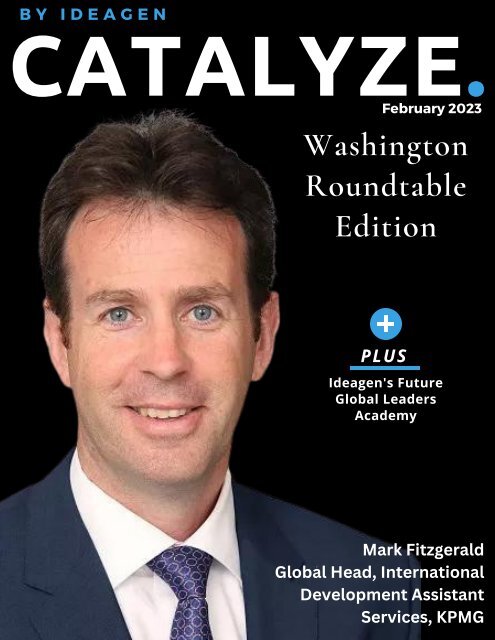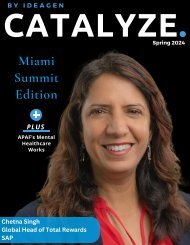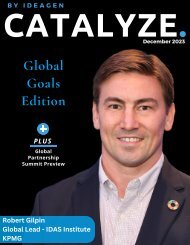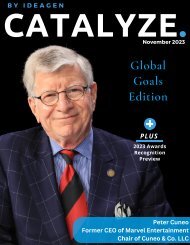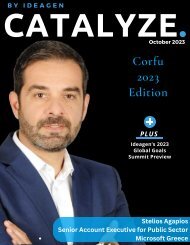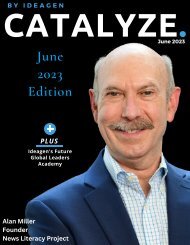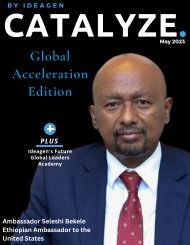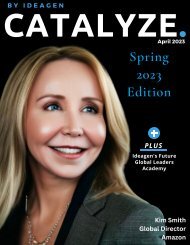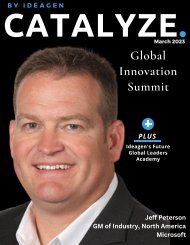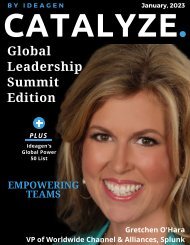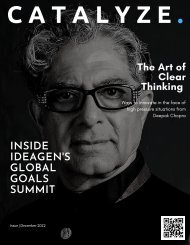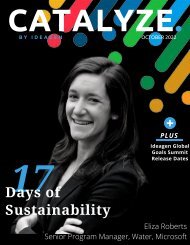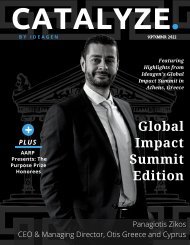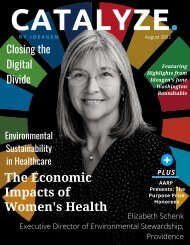Ideagen Global - Catalyze Magazine, February 2023
With Ideagen's extensive member network and influential platform, Catalyze Magazine serves as an aggregate for all the content, events, articles, and collaboration that we do. It is a monthly magazine where you will find transcriptions from Ideagen events, content, articles, and information surrounding how we are completing our mission. With this magazine, we want to highlight the nature of cross-sector collaboration and how we infuse it into our daily mission on a global scale. Ideagen's monthly Catalyze Magazine is back in 2023 with our February edition. Inside, view conversations from our first Washington Roundtable in the New Year! This months covers features speakers from the February Washington Roundtable: Mark Fitzgerald, Rawle Andrews Jr, Manoli Lagos, Alan Miller, Ilana Ron Levey, Bill Ashworth, Nicole Hayre, Winston Chang, Theodoros Bizakis, Paula Tavares, Ashley Mills, Dave Grimaldi, Rosie Chawla, and Esteban Olivares
With Ideagen's extensive member network and influential platform, Catalyze Magazine serves as an aggregate for all the content, events, articles, and collaboration that we do. It is a monthly magazine where you will find transcriptions from Ideagen events, content, articles, and information surrounding how we are completing our mission. With this magazine, we want to highlight the nature of cross-sector collaboration and how we infuse it into our daily mission on a global scale.
Ideagen's monthly Catalyze Magazine is back in 2023 with our February edition. Inside, view conversations from our first Washington Roundtable in the New Year!
This months covers features speakers from the February Washington Roundtable: Mark Fitzgerald, Rawle Andrews Jr, Manoli Lagos, Alan Miller, Ilana Ron Levey, Bill Ashworth, Nicole Hayre, Winston Chang, Theodoros Bizakis, Paula Tavares, Ashley Mills, Dave Grimaldi, Rosie Chawla, and Esteban Olivares
You also want an ePaper? Increase the reach of your titles
YUMPU automatically turns print PDFs into web optimized ePapers that Google loves.
B Y I D E A G E N<br />
CATALYZE.<br />
<strong>February</strong> <strong>2023</strong><br />
Washington<br />
Roundtable<br />
Edition<br />
PLUS<br />
<strong>Ideagen</strong>'s Future<br />
<strong>Global</strong> Leaders<br />
Academy<br />
Mark Fitzgerald<br />
<strong>Global</strong> Head, International<br />
Development Assistant<br />
Services, KPMG
B Y I D E A G E N<br />
CATALYZE.<br />
<strong>February</strong> <strong>2023</strong><br />
Washington<br />
Roundtable<br />
Edition<br />
PLUS<br />
<strong>Ideagen</strong>'s Future<br />
<strong>Global</strong> Leaders<br />
Academy<br />
Rawle Andrews Jr.<br />
Executive Director<br />
American Psychiatric<br />
Association Foundation
B Y I D E A G E N<br />
CATALYZE.<br />
<strong>February</strong> <strong>2023</strong><br />
Washington<br />
Roundtable<br />
Edition<br />
PLUS<br />
<strong>Ideagen</strong>'s Future<br />
<strong>Global</strong> Leaders<br />
Academy<br />
Manoli Lagos<br />
Founder<br />
The Living Fuel Consulting
B Y I D E A G E N<br />
CATALYZE.<br />
<strong>February</strong> <strong>2023</strong><br />
Washington<br />
Roundtable<br />
Edition<br />
PLUS<br />
<strong>Ideagen</strong>'s Future<br />
<strong>Global</strong> Leaders<br />
Academy<br />
Alan Miller<br />
Founder<br />
The News Literacy Project
B Y I D E A G E N<br />
CATALYZE.<br />
<strong>February</strong> <strong>2023</strong><br />
Washington<br />
Roundtable<br />
Edition<br />
PLUS<br />
<strong>Ideagen</strong>'s Future<br />
<strong>Global</strong> Leaders<br />
Academy<br />
Ilana Ron Levey<br />
Managing Director, Public Sector<br />
Gallup
B Y I D E A G E N<br />
CATALYZE.<br />
<strong>February</strong> <strong>2023</strong><br />
Washington<br />
Roundtable<br />
Edition<br />
PLUS<br />
<strong>Ideagen</strong>'s Future<br />
<strong>Global</strong> Leaders<br />
Academy<br />
Bill Ashworth<br />
Head of Government Affairs<br />
NIO
B Y I D E A G E N<br />
CATALYZE.<br />
<strong>February</strong> <strong>2023</strong><br />
Washington<br />
Roundtable<br />
Edition<br />
PLUS<br />
<strong>Ideagen</strong>'s Future<br />
<strong>Global</strong> Leaders<br />
Academy<br />
Dr. Nicole Hayre<br />
Founder<br />
Cutocin, Cosmetic Dermatology Center
B Y I D E A G E N<br />
CATALYZE.<br />
<strong>February</strong> <strong>2023</strong><br />
Washington<br />
Roundtable<br />
Edition<br />
PLUS<br />
<strong>Ideagen</strong>'s Future<br />
<strong>Global</strong> Leaders<br />
Academy<br />
Winston Chang<br />
CTO, Public Sector<br />
Snowflake
B Y I D E A G E N<br />
CATALYZE.<br />
<strong>February</strong> <strong>2023</strong><br />
Washington<br />
Roundtable<br />
Edition<br />
PLUS<br />
<strong>Ideagen</strong>'s Future<br />
<strong>Global</strong> Leaders<br />
Academy<br />
Theodoros Bizakis<br />
Minister Counselor-Deputy<br />
Greek Embassy to the US
B Y I D E A G E N<br />
CATALYZE.<br />
<strong>February</strong> <strong>2023</strong><br />
Washington<br />
Roundtable<br />
Edition<br />
PLUS<br />
<strong>Ideagen</strong>'s Future<br />
<strong>Global</strong> Leaders<br />
Academy<br />
Paula Tavares<br />
Senior Legal & Gender Specialist<br />
World Bank
B Y I D E A G E N<br />
CATALYZE.<br />
<strong>February</strong> <strong>2023</strong><br />
Washington<br />
Roundtable<br />
Edition<br />
PLUS<br />
<strong>Ideagen</strong>'s Future<br />
<strong>Global</strong> Leaders<br />
Academy<br />
Ashley Mills<br />
CEO<br />
The Vision Council
B Y I D E A G E N<br />
CATALYZE.<br />
<strong>February</strong> <strong>2023</strong><br />
Washington<br />
Roundtable<br />
Edition<br />
PLUS<br />
<strong>Ideagen</strong>'s Future<br />
<strong>Global</strong> Leaders<br />
Academy<br />
Dave Grimaldi<br />
Executive VP, Government Relations<br />
The Blockchain Association
B Y I D E A G E N<br />
CATALYZE.<br />
<strong>February</strong> <strong>2023</strong><br />
Washington<br />
Roundtable<br />
Edition<br />
PLUS<br />
<strong>Ideagen</strong>'s Future<br />
<strong>Global</strong> Leaders<br />
Academy<br />
Rosie Chawla<br />
Director of <strong>Global</strong> Education<br />
Projects & Partnershipss<br />
UNESCO Center For Peace
B Y I D E A G E N<br />
CATALYZE.<br />
<strong>February</strong> <strong>2023</strong><br />
Washington<br />
Roundtable<br />
Edition<br />
PLUS<br />
<strong>Ideagen</strong>'s Future<br />
<strong>Global</strong> Leaders<br />
Academy<br />
Esteban Olivares<br />
Head of Academics & New University Partnerships<br />
Summer Discovery
M A R K F I T Z G E R A L D , G L O B A L H E A D ,<br />
I N T E R N A T I O N A L D E V E L O P M E N T<br />
A S S I S T A N C E S E R V I C E S , K P M G<br />
George Sifakis: Mark, I'd like to talk a little more<br />
specifically. You talked about so many incredible issues<br />
- take us on a deeper dive into some of the work you're<br />
doing, I know there's a lot, but if you could pick one.<br />
Mark Fitzgerald: I'll pick three.<br />
George: Even better.<br />
<br />
Mark: Three levels, but the same issue. Let's focus on Ukraine. I'm incredibly proud<br />
of the different elements we've touched around that tragedy in Ukraine, one being<br />
with our own people. I talked about our stakeholders and heavily focused on clients,<br />
but our stakeholders are also our own people. We have a firm in Ukraine, and many<br />
in the firm have not seen their families for over a year now once we've gone past the<br />
anniversary. As wives and children have left and are living in Germany, the UK, or<br />
elsewhere in Europe, many of the fighting-age males remaining in our firm in<br />
Ukraine are continuing to work. Not only are they just working, but thinking about<br />
reconstruction. They're embedding themselves with ministries within the<br />
government to help them and to guide them around what a potential rebuild can look<br />
like. You know, in our industry, we always talk about opportunities, except with<br />
Ukraine, we talk about needs. We don't want this to be self-serving. It's not. It's<br />
about rebuilding a country that needs help from the international community, but<br />
also about supporting the Ukrainians themselves. And our whole focus is on<br />
maintaining that engagement with our colleagues in Ukraine.<br />
CATALYZE MAGAZINE | 1
CATALYZE MAGAZINE | 2<br />
M A R K F I T Z G E R A L D C O N T I N U E D . . .<br />
The second level would be, and George, you know me personally, I sit on the chair of a<br />
large NGO based here in D.C. called PACT. They had teams already operating in Ukraine<br />
when the US government reached out to them and said, can you help us with the health<br />
systems in Ukraine right now? Not when the war is going to end, but right now, to give<br />
them that support. So we have teams within PACT who work with three hours of power a<br />
day from wherever they feel safe in a way that can be fulfilling and ultimately supportive<br />
over time.<br />
George: Wow.<br />
Mark: And then, more broadly, we have clients where we can support the clients to do<br />
what they do best in that war environment. I came back from a country in the Middle East,<br />
and they have a faith-based organization with significant communities of 300,00 people<br />
that they provide humanitarian and social support to in Ukraine. Half of them were<br />
evacuated in the first 2 or 3 months of the war, the rest ensued, and they need that<br />
support... So maintaining that awareness of the physical threat that this particular client of<br />
ours has on a daily basis and still does what its general purpose and mission is, it's<br />
incredibly compelling to be involved with that.
Join <strong>Ideagen</strong> and Summer Discovery July 23 to<br />
August 4th for the Future <strong>Global</strong> Leaders<br />
Academy!<br />
Future <strong>Global</strong> Leaders Academy<br />
Presented by <strong>Ideagen</strong>®<br />
Hosted at Barnard, Columbia University in New York City, The<br />
Future <strong>Global</strong> Leaders Academy brings students aged 14-18<br />
from across the globe to engage in hands-on projects that will<br />
tackle the United Nation’s 17 Sustainable Development Goals<br />
established in 2015<br />
Visit the Summer Discovery course page below to learn more<br />
CATALYZE MAGAZINE | 3
RAWLE ANDREWS JR.<br />
ANNOUNCES THE FIRST-<br />
STEP PLAN<br />
EXECUTIVE DIRECTOR OF THE<br />
AMERICAN PSYCHIATRIC<br />
ASSOCIATION FOUNDATION<br />
George Sifakis: Your announcement to double, triple, quadruple down and say "we're<br />
making a financial commitment to mainstreaming mental health and awareness of it." To<br />
say that the foundation, the APA, is behind this in this most critical time, post-COVID.<br />
You know, the entire planet has been through the same thing for the first time in human<br />
history, and I believe mental health is probably one of if not the number one issue, a<br />
tangent to the number one issue.<br />
Rawle Andrews Jr.: So George, let me say one other thing about the first step campaign.<br />
This is not a hit-and-run. This is a five to seven-year commitment. So, year after year, we<br />
cannot do it alone. You and I have talked before, and hopefully, we'll talk today about the<br />
power of collaboration, but we're going to stick to this. So the first phase of First Step is<br />
just to focus on the treatability of baseline mental illnesses. Depression, anxiety, PTSD;<br />
these are treatable conditions, but people suffer in silence, self-diagnose, then sometimes<br />
self-medicate. We can stop that.<br />
CATALYZE MAGAZINE | 4
FIRST-STEP PLAN<br />
CONTINUED...<br />
Rawle: After we get through this one and move to phase two, we move from awareness to<br />
behavior. Now what we're going to say is when you go to any health provider, you don't<br />
necessarily have to go to a psychiatrist. Now, this is weird for a medical society. We're<br />
not saying come to the APA, we're saying when you go to your gynecologist, when you<br />
go to your pediatrician, when you go to your primary care and they talk about how your<br />
knee might need replacement, how you feel about that, stay in that conversation with that<br />
medical professional. That's about behavior. When we get to the third phase, what we<br />
hope all will say is, "there is no health without mental health." George, when we came up,<br />
all you ever saw were GM and Ford cars in the commercials. Now everything is what's<br />
your A1C score. Nobody talks about diabetes and stigma. Nobody talks about HIV and<br />
stigma. They're just talking about; how do you live your life with a chronic illness. That<br />
might be our situation with mental health.<br />
CATALYZE MAGAZINE | 5
THE LIVING FUEL'S<br />
5 PILLARS<br />
MANOLI LAGOS<br />
FOUNDER, THE LIVING FUEL<br />
George Sifakis: What is your journey, and<br />
how did you end up here?<br />
<br />
Manoli Lagos: It's funny. I never saw<br />
myself as an entrepreneur, even though it<br />
ran in my family's blood. My dad was an<br />
entrepreneur, but I worked for a big<br />
company, PricewaterhouseCoopers, doing<br />
consulting for six years, traveling a lot,<br />
working a pretty high-stress job. Then in<br />
my fifth/sixth year, I started to get a lot of<br />
symptoms of burnout. At the time, I had no<br />
idea what burnout was, but I was waking<br />
up after 8 or 9 hours of sleep, feeling<br />
exhausted. I had a hypo thyroid issue, and<br />
being in my mid-twenties, I knew<br />
something was up to have a thyroid<br />
imbalance. I had autoimmunity; I was<br />
getting sick all the time, and I couldn't<br />
figure it out.<br />
<br />
So I started to take my health a little more<br />
seriously through my own learnings and<br />
seeing some holistic practitioners in New<br />
York. I did a lot of nutrition and lifestyle<br />
work and was able to get myself fully<br />
healthy without medications in about 6 to 9<br />
months. That became a huge awakening<br />
for me. After that, I saw food as more<br />
medicine, not as just purely fuel for your<br />
body. Calories in, calories out, as we've<br />
been taught.<br />
I saw it as so much more; it got me<br />
intrigued. It led to me going back to<br />
school and pursuing nutrition while I<br />
was a full-time consultant. Then I<br />
started coaching people. I found it<br />
really natural, and I loved coaching<br />
friends and family. Whether they<br />
wanted to lose weight, wanted more<br />
energy, were having sleep issues, or<br />
had stress that wasn't something they<br />
could handle. I was helping people<br />
naturally, and a few clients turned<br />
into five, ten, 15, 20. Then at one<br />
point, I realized I was so busy with<br />
my side hustle and was so much<br />
more passionate about it. I found<br />
myself in my free time reading<br />
nutrition articles, sending my family<br />
stuff, researching new supplements,<br />
and I said, 'why don't I just do this<br />
full time?'<br />
CATALYZE MAGAZINE | 6
THE LIVING FUEL'S 5<br />
PILLARS CONTINUED...<br />
Manoli: Then when I felt comfortable, I made that leap and started the coaching<br />
business, which was mostly working with people one-on-one. My ultimate dream<br />
was to help companies like PwC because those are the employees I feel need it<br />
most. They're working in high-stress jobs, eating out all the time, and not sleeping<br />
in their bed because they're traveling, so their routine is very off. I figured I could<br />
help those people the most, and now 4 or 5 years later, we are working with some<br />
of these big companies. Deloitte is one of our clients, so it's pretty cool to see<br />
things come full circle.<br />
George: What an incredible journey. And as I understand it, the living fuel is built<br />
on five pillars. I'd love to hear what those five pillars are.<br />
Manoli: Yeah, so nutrition, as I mentioned before, is such a big one. The fuel, the<br />
food that we put into our body. That one's not a surprise. Our environment is<br />
number two; the physical environment that shapes our daily habits. Things that are<br />
commonly swept under the rug in our environment are things like household<br />
toxins. Many of us aren't aware of all the potentially harmful things in the average<br />
household, so I help educate people about that. Movement is the third pillar, and it's<br />
not just exercising, it's movement as a whole that's really important for longevity<br />
and staying healthy. Next, mental health; through COVID we've seen that mental<br />
health is of the utmost importance right now. From stress and anxiety to the way<br />
people manage their mental health state and their emotions is super important. And<br />
the last one is sleep. This one is kind of swept under the rug as well, especially in<br />
corporate culture, where we're taught that the longer that we're working and the less<br />
that we sleep, the better. That's glorified in the corporate work culture, and it was<br />
one of the things that I think contributed to the illnesses I was suffering in my mid-<br />
20s. So sleep is absolutely pivotal, and it's the final of those five big pillars.<br />
CATALYZE MAGAZINE | 7
Director of Product Marketing at Microsoft,<br />
Grace Clack, outlines the progress made from<br />
Microsoft's sustainability journey and the<br />
lessons learned to improve in <strong>2023</strong>.<br />
<br />
By utilizing data to understand the impacts of<br />
their initiatives and developing partnerships<br />
with like-minded organizations, Microsoft's<br />
sustainability commitments are generating<br />
impact within communities and creating<br />
competitive advantages.<br />
Grace Clack<br />
Director of Product Marketing<br />
Microsoft<br />
To read Grace's full blog post, click the link below!<br />
CATALYZE MAGAZINE | 8
NIO'S THREE TIERED<br />
ELECTRIC BATTERY<br />
SOLUTIONS<br />
BILL ASHWORTH<br />
HEAD OF GOVERNMENT AFFAIRS<br />
NIO<br />
George Sifakis: What are the biggest challenges that you're seeing facing the electric vehicle industry today, and<br />
how is NIO addressing those challenges?<br />
Bill Ashworth: Great question, so one of the things that NIO focused on when they were first starting their go-tomarket<br />
strategy overseas, in China, and Europe was, what are those barriers to early adoption? What do people care<br />
about, or what's giving them pause when purchasing an electric vehicle? And what we found from all the data we<br />
saw is that it's mostly centered around the reliability and cost of the battery. The battery cost is the highest of the<br />
electric vehicle, so we said to ourselves, how can we reduce the cost and the perception of reliability, to make this<br />
more seamless and comfortable purchase for consumers? How can we lower our cost to reduce the overall cost of the<br />
product?<br />
NIO has really come up with a very innovative solution, and it's the battery swapping technology or battery as a<br />
service. We offer three types of battery solutions. The first is home charging, which I'm sure most people are familiar<br />
with. We have different home charging services and different power levels of home charging. Some of our home<br />
chargers can recharge your car in about three hours, while others take about 12 hours, depending upon the type of<br />
home battery charging station you purchased. The other is the battery swapping stations, where you drive into a<br />
battery swapping station, maybe half the size of this room, so it's fairly small. You're in, and in under three minutes,<br />
you can have your old battery swapped out for a new one, and you'll be right back on the road. It's very analogous to<br />
just pulling into a gas station, going in and getting a cup of coffee, coming back out, and having your gas tanks filled.<br />
The third power solution is NIO mobile charge, where you can actually schedule a NIO power supply truck to come<br />
to you and charge your battery. It's a subscription model, and right now the price point is about $140 a month, but it's<br />
cut the cost of the battery component of the overall cost by about 50% just in the past ten years. That's what we see<br />
as the biggest obstacle to EV adoption right now, and these are our solutions to that problem.<br />
CATALYZE MAGAZINE | 9
I D E A G E N ®<br />
G l o b a l I n n o v a t i o n S u m m i t<br />
Streaming March 31st on<br />
<strong>Ideagen</strong><br />
<strong>Ideagen</strong>global.com | Presented <strong>Global</strong>ly by<br />
CATALYZE MAGAZINE | 10
CUTOCIN AND A DIFFERNT<br />
TYPE OF PATIENT CARE<br />
DR. NICOLE HAYRE<br />
FOUDER<br />
CUTOCIN & THE COSMETIC DERMATOLOGY CENTER<br />
George Sifakis: How do you<br />
approach patient care differently<br />
than others in your field?<br />
Dr. Nicole Hayre: Well, I would say<br />
multiple ways. For instance, I<br />
think I've been looking at the<br />
whole body system more than<br />
other physicians. I was aware of<br />
the importance of vitamins and<br />
probiotics for many years before<br />
they became trendy. I also look at<br />
things from a very science-driven<br />
angle because of my background,<br />
so I'll really hyper analyze things.<br />
How is this really going to work?<br />
Is it safe? Would I do this to<br />
myself? So that's a little bit of a<br />
different approach, and I think a<br />
lot of the people who come to me<br />
really appreciate that because<br />
they feel that they're in good<br />
hands. Maybe It's a little safer<br />
because I am so critical of new<br />
things coming to market.<br />
George: Well, that's what you<br />
see in the medical profession,<br />
and in any profession, as you<br />
know, there's just so much<br />
information out there. Where<br />
do you begin? And you're<br />
obviously a trusted source and<br />
provider of information<br />
because you're vetting it, you're<br />
reviewing it, and you're not only<br />
doing that, you're developing<br />
products like Cutocin that are<br />
helping to change the world by<br />
making people feel better.<br />
CATALYZE MAGAZINE | 11
DR. NICOLE HAYRE<br />
CONTINUED<br />
Dr. Hayre: Yes, patients really respond to Cutocin, and I have to say, I've never seen<br />
such a strong response to a skincare line before. I've been selling them in my<br />
office for 20 years, and after the pandemic, when I had just started selling Cutocin,<br />
there were a couple of times we had supply issues and would run out. Some of the<br />
women who ran out of their product would come in, and I'd say, I'm sorry, it's<br />
going to be a couple of weeks, we're still waiting on a shipment, and they'd panic.<br />
I mean, sheer out panic. I've never seen anything like it before<br />
George: Because they felt so good with it.<br />
Dr. Hayre: They felt so good with it and had such a good response. Then when the<br />
product would come in, they would buy three at a time to ensure they wouldn't<br />
run out again. It was fantastic. So I knew it was something that was really<br />
affecting them.<br />
CATALYZE MAGAZINE | 12
G L O B A L<br />
Data Partnerships<br />
& Responsible<br />
Stewardship<br />
Winston Chang<br />
CTO, Public Sector<br />
Snowflake<br />
George Sifakis: What do you see as the impact and outcome of partnerships<br />
specifically? Then taking it a step further, we talked about the cross-sector<br />
piece: why is that cross-sector piece, within the context of developing<br />
partnerships, so vitally important?<br />
Winston Chang: Well, I think you see a lot of impacts; take Ukraine for an<br />
example. The ability of so many different nations to support Ukraine at a data<br />
level, to be able to look at the intelligence and bring it together, coalesce it, and<br />
share it among allies in order to support a set of people's freedoms. But I would<br />
also warn, or maybe give a heads up, especially to the global public sector, to<br />
think about how this technology actually changes the way you have to operate.<br />
The reason I flagged this is that we all talk about how data is the new oil, and<br />
we treat data as an asset like it should be treated. However, governments have a<br />
stewardship responsibility around that asset. You think of the value of a data<br />
asset, like what commerce will do or what USAID does in the United States.<br />
That data is extremely valuable, especially when combined in collaboration with<br />
the private sector or other sorts of nonprofits. However, that stewardship,<br />
because of the ease of sharing data, has now changed.<br />
CATALYZE MAGAZINE | 13
D A T A P A R T N E R S H I P S & R E S P O N S I B L E<br />
S T E W A R D S H I P C O N T I N U E D<br />
Winston: And I'll give you some examples here. Let's say we talk about Alaska. In the<br />
United States, Alaska has access to a resource called oil which we all know is incredibly<br />
valuable, and it is responsible and pays back the dividends that come from that oil to its<br />
citizens. Another example would be our pensions benefit group, PBGC'S, which invests<br />
and supports all the pension benefits as a backup insurance group. However, it has to reinvest<br />
its assets. Similarly, data is an asset, and many organizations around the world now<br />
need to look at their nation's data. When you look at the European landscape and how data<br />
is starting to map out, you're going to have very country-specific data centers where data<br />
is not allowed to leave the country. However, that data is extremely valuable. So what is<br />
the responsibility as the data steward now for that country? Those are the things we need<br />
to think about, what that actually means, how to potentially make money off that, and<br />
where does that money go?<br />
CATALYZE MAGAZINE | 14
IDEAGEN®<br />
Washington Roundtable<br />
Streaming Now on <strong>Ideagen</strong><br />
<strong>Ideagen</strong>global.com | Presented <strong>Global</strong>ly by<br />
CATALYZE MAGAZINE | 15
MINDFRAMES<br />
OF OBSERVING THE<br />
NEWS<br />
By: Alan Miller: Founder, News Literacy Project<br />
George Sifakis: What types of mindsets and what are those markers that we're looking for<br />
when analyzing the validity of news and content sources and other types of information?<br />
What are we looking for? What can you point to that says, aha, that's legitimate, trusted<br />
information?<br />
Alan Miller: Yes, and it's very important to underscore, we don't tell people what to trust;<br />
we're giving them the tools to make that determination themselves. And so, I would say<br />
the first thing is to pause when you encounter any piece of content and ask yourself, what<br />
are you looking at? Is this purported to be news? Is this opinion? Is this advertising? Is it<br />
raw information? Is it something that seems to be intended to inform you in an accurate<br />
and dispassionate and transparent way? Or is it something that seeks to sell, to persuade, or<br />
very importantly, to inflame?<br />
.<br />
If it's something that's really appealing to your emotions, that's a red flag. When<br />
something gets us angry, agitated, or fearful, the thinking part of our brain often shuts<br />
down, and we react more viscerally. Look at the source, is this trusted? Can you tell who<br />
created this piece of content? What are the sources cited? Is there evidence to support the<br />
facts in the piece? Do you have multiple points of view? Are you given information to<br />
allow you to make up your mind about something, or does it seem to be pushing you in a<br />
particular direction? Then you might look at the comments and see whether it's been factchecked<br />
by independent sources, including rumor guard. If you sink in one place, it may<br />
well not be true, especially if it seems to be too good or outrageous to be true, it's another<br />
reason to pause.<br />
CATALYZE MAGAZINE | 16
MINDFRAMES OF OBSERVING THE NEWS<br />
CONTINUED...<br />
Alan: The other thing to recognize, and you mentioned the pandemic which is a good example,<br />
is that truth often takes time. You need to follow a story over time, especially when there's a fastbreaking<br />
story that gets a lot of attention and appeals to our emotions. As journalists or scientists<br />
are trying to determine the facts, the bad actors come in and try to set the narrative. So that's a<br />
particular reason to pause and wait until you're confident, not only with whether you trust this,<br />
but very importantly, whether you share. The viral rumors and the toxic misinformation can't get<br />
the kind of scale that it reaches without so many of us often inadvertently spreading this to<br />
others.<br />
<strong>2023</strong> Purpose Prize Winners<br />
CATALYZE MAGAZINE | 17
LIFE IN<br />
AFGHANISTAN<br />
F e a t u r i n g I l a n a R o n L e v e y , M a n a g i n g D i r e c t o r ,<br />
P u b l i c S e c t o r a t G a l l u p<br />
George Sifakis: And what about<br />
Afghanistan? I know you mentioned<br />
Afghanistan. What is life like right<br />
now for the Afghan people?<br />
Ilana Ron Levey: Yes, we're very<br />
proud of our polling history in<br />
Afghanistan. Gallup has been the only<br />
organization able to collect nationally<br />
representative data under the Taliban<br />
in both rounds, so we have a pretty<br />
unique lens. We are seeing dismal,<br />
dismal views from the Afghan people,<br />
and it's not surprising. 62% of Afghans<br />
are dissatisfied with their freedoms,<br />
both men and women. There's been a<br />
curtailing of all kinds of freedoms.<br />
Freedom of expression, freedom of<br />
mobility, and autonomy in your lives.<br />
90% of Afghans say that it's difficult<br />
or very difficult to get by on their<br />
household income. In the last 12<br />
months, 86% of Afghans say they've<br />
had difficulty affording food for their<br />
households. Except for once in the<br />
Central African Republic, that's the<br />
highest level of food insecurity in the<br />
last 16 years in all countries we've<br />
surveyed through the world poll. .<br />
So what we're really seeing is a<br />
breakdown in the ability to provide for<br />
families, a breakdown in economic<br />
opportunity, and a breakdown in job<br />
prospects. Everyone knows that, but<br />
these numbers are just so staggering.<br />
Close to 1 in 9 Afghans are having<br />
difficulty providing food, and over<br />
90% have concerns about getting by<br />
on their household income.<br />
George: And so I imagine that when<br />
global leaders look at what's<br />
happening in Afghanistan, certainly<br />
intelligence agencies, there's a direct<br />
correlation when you're looking at this<br />
data that can help decipher that. But<br />
I'm sure you also, with this<br />
information, help inform and affect<br />
their decision-making as well.<br />
Ilana: Absolutely, because I think<br />
many people wonder, did the Afghan<br />
people embrace the Taliban, and are<br />
they supportive of the direction of the<br />
country? Do they feel like more<br />
opportunities are being unlocked for<br />
their population? And I think we're<br />
seeing a very different picture.<br />
CATALYZE MAGAZINE | 18
Editor's Note<br />
Dear Friends and Colleagues, We are underway in this new<br />
year with a fresh start in <strong>2023</strong>, and there are numerous positive<br />
trends and advancements to be optimistic about. From<br />
breakthroughs in technology to inspiring advancements in<br />
sustainability, it's an exciting time to be alive. We are seeing<br />
communities come together in new ways with a renewed focus<br />
on changing the world. The world continues to evolve, with ai<br />
and virtual experiences becoming increasingly accessible and<br />
diverse, including the latest from ChatGPT and OpenAI.<br />
As we move forward into the year, it's important to celebrate<br />
these advancements and continue to strive toward a brighter<br />
future. At <strong>Catalyze</strong> <strong>Magazine</strong> by <strong>Ideagen</strong> <strong>Global</strong>, we are<br />
thrilled to be a part of this positive movement and can't wait to<br />
share all the exciting developments with our readers in <strong>2023</strong>!<br />
GEORGE SIFAKIS<br />
GEORGE SIFAKIS<br />
Editor-in-Chief & CEO<br />
-<strong>Ideagen</strong><br />
CATALYZE MAGAZINE | 19<br />
ALEXA SIFAKIS<br />
Senior Editor <br />
DANIEL KERNS<br />
Publication Co-Editor<br />
Pictured Top to Bottom<br />
George Sifakis, <strong>Ideagen</strong><br />
Rawle Andrews, Jr. APAF<br />
Nasdaq Board Times Square


